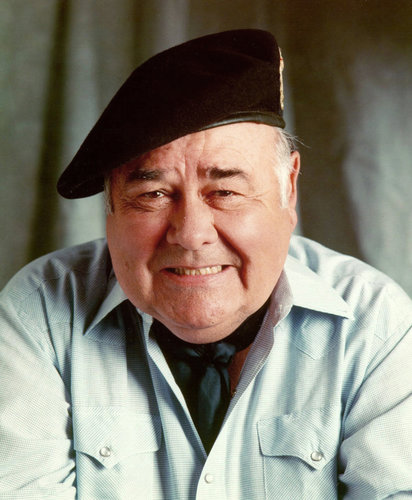| T O P I C R E V I E W |
| lemonade kid |
Posted - 12/04/2013 : 20:50:20
Jonathan Winters, Funny Man and Comedic Inspiration, Dies at 87
By WILLIAM GRIMES-NY Times
Published: April 12, 2013

Montage--Orinda Film Festival...when Jack Parr hands Johnny a stick to improvise it's pure genius
https://www.youtube.com/watch?feature=endscreen&NR=1&v=For2X31-x-M
Jonathan Winters, the rubber-faced comedian whose unscripted flights of fancy inspired a generation of improvisational comics, and who kept television audiences in stitches with Main Street characters like Maude Frickert, a sweet-seeming grandmother with a barbed tongue and a roving eye, died on Thursday at his home in Montecito, Calif. He was 87.
His death was announced on his Web site, JonathanWinters.com.
Mr. Winters, a rotund man whose face had a melancholy basset-hound expression in repose, burst onto the comedy scene in the late 1950s and instantly made his mark as one of the funniest, least definable comics in a rising generation that included Mort Sahl, Shelley Berman and Bob Newhart.
Mr. Winters was at his best when winging it, confounding television hosts and luckless straight men with his rapid-fire delivery of bizarre observations uttered by characters like Elwood P. Suggins, a Midwestern Everyman, or one-off creations like the woodland sprite who bounded onto Jack Paar’s late-night show and simperingly proclaimed: “I’m the voice of spring. I bring you little goodies from the forest.”
A one-man sketch factory, Mr. Winters could re-enact Hollywood movies, complete with sound effects, or create sublime comic nonsense with simple props like a pen-and-pencil set.
The unpredictable, often surreal quality of his humor had a powerful influence on later comedians like Robin Williams but made him hard to package as an entertainer. His brilliant turns as a guest on programs like “The Steve Allen Show” and “The Tonight Show” — in both the Jack Paar and Johnny Carson eras — kept him in constant demand. But a successful television series eluded him, as did a Hollywood career, despite memorable performances in films like “It’s a Mad, Mad, Mad, Mad World,” “The Loved One” and “The Russians Are Coming, the Russians Are Coming.”
Jonathan Harshman Winters was born on Nov. 11, 1925, in Dayton, Ohio, where his alcoholic father (“a hip Willy Loman,” according to Mr. Winters) worked as an investment broker and his grandfather, a frustrated comedian, owned the Winters National Bank.
“Mother and dad didn’t understand me; I didn’t understand them,” he told Jim Lehrer on “The NewsHour With Jim Lehrer” in 1999. “So consequently it was a strange kind of arrangement.” Alone in his room, he would create characters and interview himself.
The family’s fortunes collapsed with the Depression. The Winters National Bank failed, and Jonathan’s parents divorced. His mother took him to Springfield, where she did factory work but eventually became the host of a women’s program on a local radio station. Her son continued talking to himself and developed a repertory of strange sound effects. He often entertained his high school friends by imitating a race at the Indianapolis Motor Speedway.
A poor student, Mr. Winters enlisted in the Marines before finishing high school and during World War II served as a gunner on the aircraft carrier Bon Homme Richard in the Pacific.
After the war he completed high school and, hoping to become a political cartoonist, studied art at Kenyon College and the Dayton Art Institute. In 1948 he married Elaine Schauder, a Dayton native who was studying art at Ohio State. She died in 2009.
At the urging of his wife, Mr. Winters, whose art career seemed to be going nowhere, entered a talent contest in Dayton with his eye on the grand prize, a wristwatch, which he needed. He won, and he was hired as a morning disc jockey at WING, where he made up for his inability to attract guests by inventing them. “I’d make up people like Dr. Hardbody of the Atomic Energy Commission, or an Englishman whose blimp had crash-landed in Dayton,” he told U.S. News and World Report in 1988.
After two years at a Columbus television station, he left for New York in 1953 to break into network radio. Instead he landed bit parts on television and, with surprising ease, found work as a nightclub comic.
A guest spot on Arthur Godfrey’s “Talent Scouts” led to frequent appearances with Jack Paar and Steve Allen, both of them staunch supporters willing to give Mr. Winters free rein. Alistair Cooke, after seeing Mr. Winters at the New York nightclub Le Ruban Bleu, booked him as the first comedian ever to appear on his arts program “Omnibus.”
In his stand-up act, Mr. Winters initially relied heavily on sound effects — a cracking whip, a creaking door, a hovering U.F.O. — which he used to spice up his re-enactments of horror films, war films and westerns. Gradually he developed a gallery of characters, which expanded when he had his own television shows, beginning with the 15-minute “Jonathan Winters Show,” which ran from 1956 to 1957. He was later seen in a series of specials for NBC in the early 1960s; on an hourlong CBS variety series, “The Jonathan Winters Show,” from 1967 to 1969; and on “The Wacky World of Jonathan Winters,” in syndication, from 1972 to 1974.
Many of Mr. Winters’s characters — among them B. B. Bindlestiff, a small-town tycoon, and Piggy Bladder, football coach for the State Teachers’ Animal Husbandry Institute for the Blind — were based on people he grew up with. Maude Frickert, for example, whom he played wearing a white wig and a Victorian granny dress, was inspired by an elderly aunt who let him drink wine and taught him to play poker when he was 9 years old.
Other characters, like the couturier Lance Loveguard and Princess Leilani-nani, the world’s oldest hula dancer, sprang from a bizarre secret compartment of Mr. Winters’s inventive brain.
As channeled by Mr. Winters, Maude Frickert was a wild card. Reminiscing about her late husband, Pop Frickert, she told a stupefied interviewer: “He was a Spanish dancer in a massage parlor. If somebody came in with a crick in their neck he’d do an orthopedic flamenco all over them. He was tall, dark and out of it.”
One of Mr. Winters’s most popular characters, she appeared in a series of commercials for Hefty garbage bags, which also featured Mr. Winters as a garbage man dressed in a spotless white uniform and referring, in an upper-class British accent, to gar-BAZH. Mr. Carson kidnapped Maude Frickert and simply changed the name to Aunt Blabby, one of his stock characters. Mr. Winters said that the blatant theft did not bother him.
Although Mr. Winters often called himself a satirist, the term does not really apply. In “Seriously Funny,” his history of 1950s and 1960s comedians, Gerald Nachman described him, a little floridly, as “part circus clown and part social observer, Red Skelton possessed by the spirit of Daumier.”
He was hard to define. “I don’t do jokes,” he once said. “The characters are my jokes.” At the same time, unlike many comedians reacting to the Eisenhower era, he found his source material in human behavior rather than politics or current events, but in him the spectacle of human folly provoked glee rather than righteous anger.
In 1961 Variety wrote, “His humor is more universally acceptable than any of the current New Comics, with the possible exception of Bob Newhart, because he covers the mass experiences of the U.S. common man — the Army, the gas station, the airport.”
Mr. Winters did much of his best work in nightclubs, but he hated life on the road. In 1959 he suffered a nervous breakdown onstage at the Hungry I in San Francisco and briefly spent time in a mental hospital. Two years later he suffered another collapse, and soon after that he quit nightclubs for good. Between 1960 and 1964 he recorded his most-requested monologues for Verve on a series of albums, notably “The Wonderful World of Jonathan Winters,” “Here’s Jonathan” and “Jonathan Winters: Down to Earth.”
The conventional television variety show did not suit Mr. Winters, but film did not seem the right medium for him either. Scripts stifled him. “Jonny works best out of instant panic,” one of his television writers in the 1960s said. He thrived when he could ad-lib, fielding unexpected questions or pursuing spontaneous flights of fancy. In other words, he made a brilliant guest, firing comedy in short bursts, but a problematic host or actor.
In the ’70s and ’80s, Mr. Winters was a frequent guest on “The Andy Williams Show,” “The Tonight Show” and “Hollywood Squares.” He played Robin Williams’s extraterrestrial baby son, Mearth, on the final season of “Mork & Mindy,” and he kept busy with voice-over work in animated television series and films. He also published a book of his cartoons, “Mouse Breath, Conformity, and Other Social Ills,” and a collection of whimsical stories, “Winters’ Tales.”
More influential than successful, Mr. Winters circled the comic heavens tracing his own strange orbit, an object of wonder and admiration to his peers. “Jonathan taught me,” Mr. Williams told the correspondent Ed Bradley on “60 Minutes,” “that the world is open for play, that everything and everybody is mockable, in a wonderful way.”
Slideshow
http://www.nytimes.com/slideshow/2013/04/12/arts/20130412_WINTERS-HTML.html?ref=television
________________________________________________
Old hippies never die, they just ramble on.
-lk |
| 2 L A T E S T R E P L I E S (Newest First) |
| rocker |
Posted - 13/04/2013 : 20:26:29
Jonathan was a comedic genius!!! Many are called...few are chosen!... Thanks Jon! Thanks Jon! |
| captain america and billy |
Posted - 13/04/2013 : 16:03:15
Robin Williams' greatest influence and true comedy legend. |
|
|


